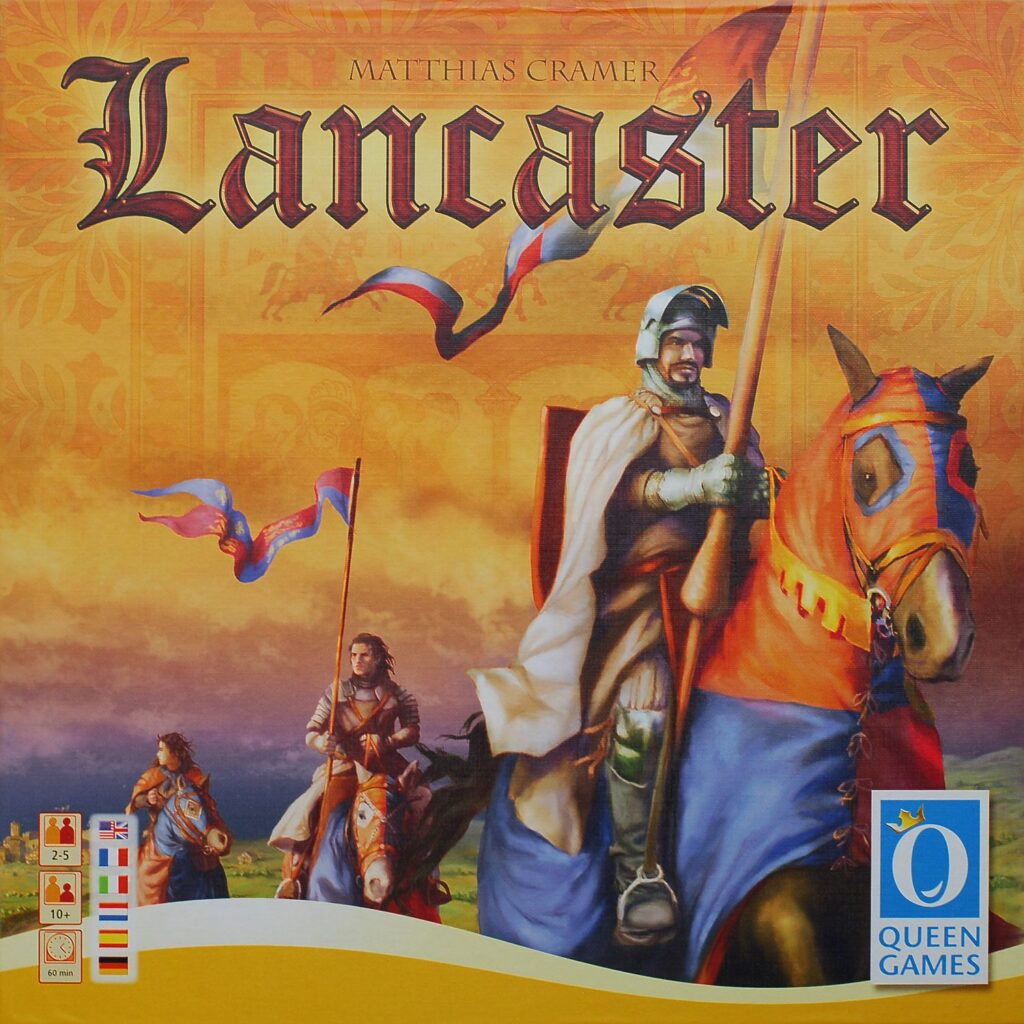How To Play: Lancaster
Oh boy, where do I start? Playing Lancaster with my friends was a hoot! From figuring out the best spots to place our knights, to adapting laws mid-game, and even backstabbing... I mean, negotiating alliances. It's all about the strategy, laughs, and the sweet taste of victory!

Hey there, fellow board game aficionados! Ever wondered how to triumph in the competitive world of Lancaster? Well, you’re in luck. I’ve played this game more times than I can count, and I’ve gathered all my top tips and strategies for winning. Plus, I’ll give you a quick outline of the game rules to get you started. So, buckle up and let’s get strategic!
Overview
What’s in the box
- 1 Game board
- 1 Score board
- 5 Player boards
- 35 Knights (7 per player)
- 20 Pages (4 per player)
- 5 Start markers (1 per player)
- 60 Squires (12 per player)
- 16 Castle (4 types)
- 42 County rewards
- 28 Foreign support tiles
- 20 Progress tiles
- 54 Coins
- 1 First player marker
- 24 Conflict cards
- 40 Vote cubes (8 per player in each player color)
- 30 Reward tiles
- 5 Noble tiles
How To Play Lancaster: Rules Summary
Setup
To start, lay out the game board in the middle of the table. Each player picks a color and takes the corresponding knights, player board, and markers. Put your score marker on the score track. Place the nobles, the laws for the current round, and conflict cards as indicated in the rulebook. Divide and place the rewards and resources in their respective spots on the board.
- Choose your color and take your components.
- Set up the game board with all pieces in designated locations.
- Prepare the resources, rewards, and cards for game play.
Gameplay
Players take turns placing their knights on the board. You can place a knight in a county for resources, on a noble for alliances, or on a conflict card to fight for rewards. Use squires to boost your knight’s strength. After all knights are placed, resolve the actions starting from the counties, then the conflicts, and finally, alliances with nobles. Update the laws at the end of each round.
- Place knights strategically to gain resources or alliances.
- Use squires to increase knights’ strength.
- Resolve actions in order: counties, conflicts, nobles.
Winning
To win Lancaster, gather the most victory points by the end of the game. Points come from counties, conflicts, nobles, and some special conditions. Keep an eye on the scoreboard and plan your strategy accordingly.
- Acquire victory points through various game actions.
- Adapt your strategy to secure the most points.
- Monitor the scoreboard to track progress.
Special Rules & Conditions
Several special rules can affect gameplay: Upgraded knights have more power but require careful planning to deploy effectively. Laws change each round, offering new strategies and challenges. Alliance negotiation plays a crucial role; forming temporary alliances can tip the scales in your favor.
- Consider knight upgrades for strategic advantages.
- Adapt to changing laws each round.
- Navigate alliances carefully for benefits.
Now that you know the basic rules, gathering your knights and planning your strategy is up to you. Good luck conquering Lancaster!
Best Lancaster Strategies
The Ultimate Knights Placement Strategies for Victory
Assess the Board Carefully
Start by scanning the board. Look where you can make the most impact. Is it the counties, the castle, or supporting allies? This decision sets the tone.
Balance Your Forces
- Don’t put all your knights in one spot. Spread them to gain diverse benefits.
- Adjust based on enemy moves. Reaction is as crucial as action.
Upgrade Wisely
Enhancing your knights increases your power. But don’t rush! Pick the right moment and knight for the job. Upgrading too soon or too late can cost you the game.
Know When to Commit
Some battles are worth more. Identify these and commit your strongest knights. Remember, it’s not just about placing knights; it’s about placing them where they change the game.
Mastering the Game: Adapting to Laws like a Pro
Winning at Lancaster isn’t just about strength; it’s about smarts, especially when it comes to laws. Here’s how you adapt and conquer:
Anticipate Changes
- Keep an eye on the upcoming laws. Planning ahead gives you the edge.
Flexibility is Key
- Don’t stick to one strategy. Be ready to shift your focus based on new laws.
Use Laws to Your Advantage
- Some laws can turn the tide of the game. Use them to disrupt opponents’ plans.
Mastering the Art of Alliance Negotiation in Board Games
Winning at board games isn’t just about the luck of the draw; it’s about mastering alliance negotiation. Here’s how:
Understanding Opponents
- Watch their moves closely. This tells you their goals.
- Adjust your strategy to either align with or counter theirs.
Communicate Effectively
- Be clear about what you want from the alliance.
- Listen to their terms and find common ground.
Maintain Flexibility
- Be ready to change alliances if it benefits your position.
- Don’t let emotions cloud your judgment.
## Conquering the Realm: Final Thoughts on Mastering Lancaster
After countless hours around the table, laughing, strategizing, and sometimes begging for alliances, it’s clear Lancaster is not just another board game. It’s a journey into the heart of medieval strategy, where every move counts, and your knights are more than mere pieces—they’re your path to victory! Remember, adapting to the laws, positioning your knights wisely, and forging alliances will not only make you a formidable lord but also enrich your friendships (or test them, let’s be honest). So gather your friends, lay out the board, and let the conquest begin. May your counsel be wise, and your knights valiant. Here’s to your next thrilling game of Lancaster!
Want to know what we think of Lancaster? Read our detailed review of Lancaster here

